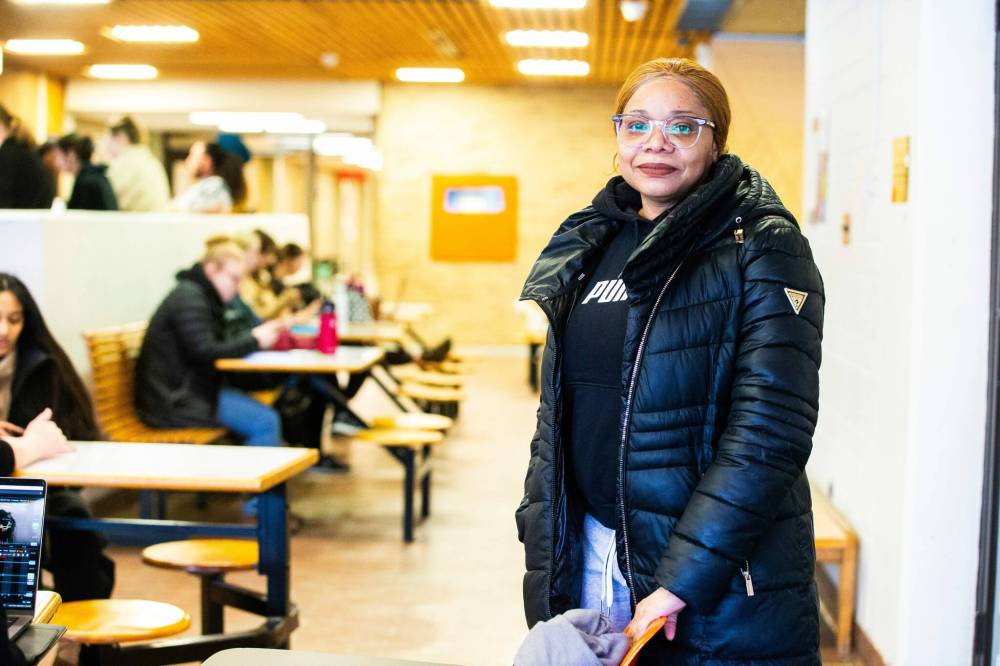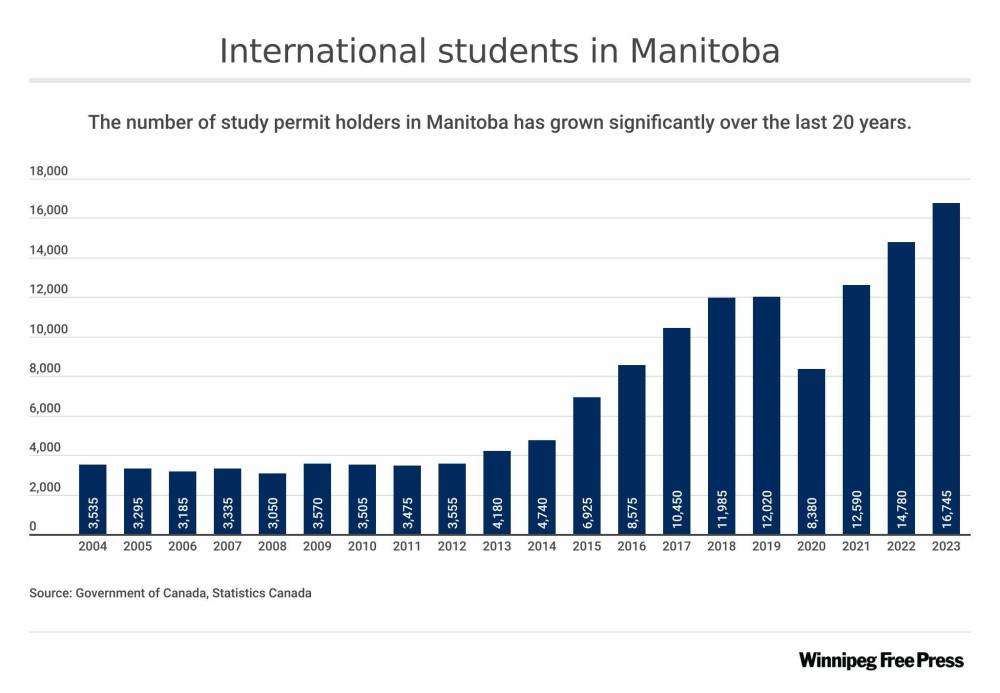Province sees surge in international students
Advertisement
Read this article for free:
or
Already have an account? Log in here »
To continue reading, please subscribe:
Monthly Digital Subscription
$0 for the first 4 weeks*
- Enjoy unlimited reading on winnipegfreepress.com
- Read the E-Edition, our digital replica newspaper
- Access News Break, our award-winning app
- Play interactive puzzles
*No charge for 4 weeks then price increases to the regular rate of $19.00 plus GST every four weeks. Offer available to new and qualified returning subscribers only. Cancel any time.
Monthly Digital Subscription
$4.75/week*
- Enjoy unlimited reading on winnipegfreepress.com
- Read the E-Edition, our digital replica newspaper
- Access News Break, our award-winning app
- Play interactive puzzles
*Billed as $19 plus GST every four weeks. Cancel any time.
To continue reading, please subscribe:
Add Free Press access to your Brandon Sun subscription for only an additional
$1 for the first 4 weeks*
*Your next subscription payment will increase by $1.00 and you will be charged $16.99 plus GST for four weeks. After four weeks, your payment will increase to $23.99 plus GST every four weeks.
Read unlimited articles for free today:
or
Already have an account? Log in here »
Hey there, time traveller!
This article was published 20/02/2024 (660 days ago), so information in it may no longer be current.
Manitoba is welcoming four times the number of international students than it did a decade ago and despite warnings from the federal government, stakeholders say local campuses can accommodate more growth.
Immigration records show at least 16,745 study permits approved in the province last year. In 2013, there were a total of 4,180.
The five-year average is currently 12,903 and that figure takes into account the COVID-19 pandemic’s wide-scale disruptions to travel and operations at local colleges and universities.

“They had a virtual tour and I really liked what I saw so right away, I was sold,” said Guyana-born Shaluckie Boatswain as she recalled her decision to apply to the University of Winnipeg.
Boatswain said she was drawn to the U of W’s small overall population, its promise of intimate class sizes that allow students to get to know their instructors, and most of all, its relatively affordable tuition in comparison to university fees elsewhere in the world.
She began her studies in 2012 — a year that marks a turning point in international student growth.
Enrolment was fairly stable with minor fluctuations in both directions in the 10 years before her move. In the years since, Manitoba has accepted an average of 1,199 visas annually.
Ottawa announced one month ago that it would cap new visas for undergraduate students in 2024 and 2025 to quell pressure on housing markets across the country and crack down on bad actors that deliver a poor education for high tuition.
The announcement has prompted panic among applicants — every foreign national who wants to study in Canada for more than six months requires a permit — and post-secondary administrators. The latter group has become increasingly reliant on international revenue to balance budgets in recent years.
Only 364,000 visas, a drop of 35 per cent, will be handed out across the country this year. Next year’s tally has yet to be released.
“The reality is we have many communities in this country with lots of absorptive capacity. They could sustainably welcome more students,” said Larissa Bezo, president and chief executive officer of the Canadian Bureau for International Education.
Manitoba is home to about 28,000 international students at present and is among those where there is “still room,” Bezo noted.
At the same time, she said the federal government needs to strike a balance because temporary residents are at risk of falling through cracks in overcrowded markets such as the Greater Toronto Area, where there are strains on housing stock, transportation and health care.
As far as she is concerned, business leaders, municipal leaders and planners should all weigh in on local plans related to temporary resident visas because they have unique insight on how immigration affects their community’s services.
Education observers attribute a surge in international student arrivals over the last dozen years to a nationwide push to market local schools and post-graduate work permits, the U.S. tightening its borders, and a decrease in public funding that has prompted schools to seek other revenue streams, among other factors.
The most popular countries of origin in 2023 were India, China, the Philippines, Nigeria and France, per an analysis from ICEF Monitor, a market intelligence resource for the industry.
Not only do international students contribute to the local economy during their studies and after graduation if they settle here, but they also bolster the overall quality of education, said Alexandra Humphries of the Manitoba Council for International Education.

“They add a lot to the cultural life of Manitoba,” said the president of the advocacy organization whose membership includes the University of Manitoba, U of W and Red River College Polytechnic.
“For our Canadian students, they really bring an internationalization to the campus and give students a chance to learn beside people from around the world and bring their perspectives.”
Humphries said members are feeling a sense of urgency to find out the logistics of the cap and are optimistic their allocation of permits will be on par with the status-quo.
“We definitely have room to grow,” she said, adding Manitoba is not facing the same pressures as its neighbours including concerns about “diploma mills” that prioritize churning out degrees for hefty fees over delivering high-quality education.
For Boatswain, who is now a Canadian citizen, the prospect of significant cutbacks to the visa program is disheartening.
“I would have loved to stay in my country. We have beautiful weather (but Guyana) is deeply divided by race and politics. As a Black woman, no matter how qualified I am, it’s hard to get a job,” she said, adding she wants others to have opportunities to better their lives through international study.
Boatswain added she wishes governments were focused on supporting universities to build more student housing and educating international students on their rights.
As a young student, she said she was exploited by a landlord who was openly racist, often entered her quarters without advance notice and scammed her out of a damage deposit because she did not know her rights.
Advanced Education Minister Renée Cable said conversations about study permit allocations linked to the new cap have yet to begin. “We are still in discussions with the federal government and are asking for Manitoba’s fair share,” Cable said in a statement Tuesday.
maggie.macintosh@freepress.mb.ca

Maggie Macintosh
Education reporter
Maggie Macintosh reports on education for the Free Press. Originally from Hamilton, Ont., she first reported for the Free Press in 2017. Read more about Maggie.
Funding for the Free Press education reporter comes from the Government of Canada through the Local Journalism Initiative.
Every piece of reporting Maggie produces is reviewed by an editing team before it is posted online or published in print — part of the Free Press‘s tradition, since 1872, of producing reliable independent journalism. Read more about Free Press’s history and mandate, and learn how our newsroom operates.
Our newsroom depends on a growing audience of readers to power our journalism. If you are not a paid reader, please consider becoming a subscriber.
Our newsroom depends on its audience of readers to power our journalism. Thank you for your support.
History
Updated on Tuesday, February 20, 2024 7:46 PM CST: Adds quotes to end of story
Updated on Tuesday, February 20, 2024 8:31 PM CST: Updates headline







